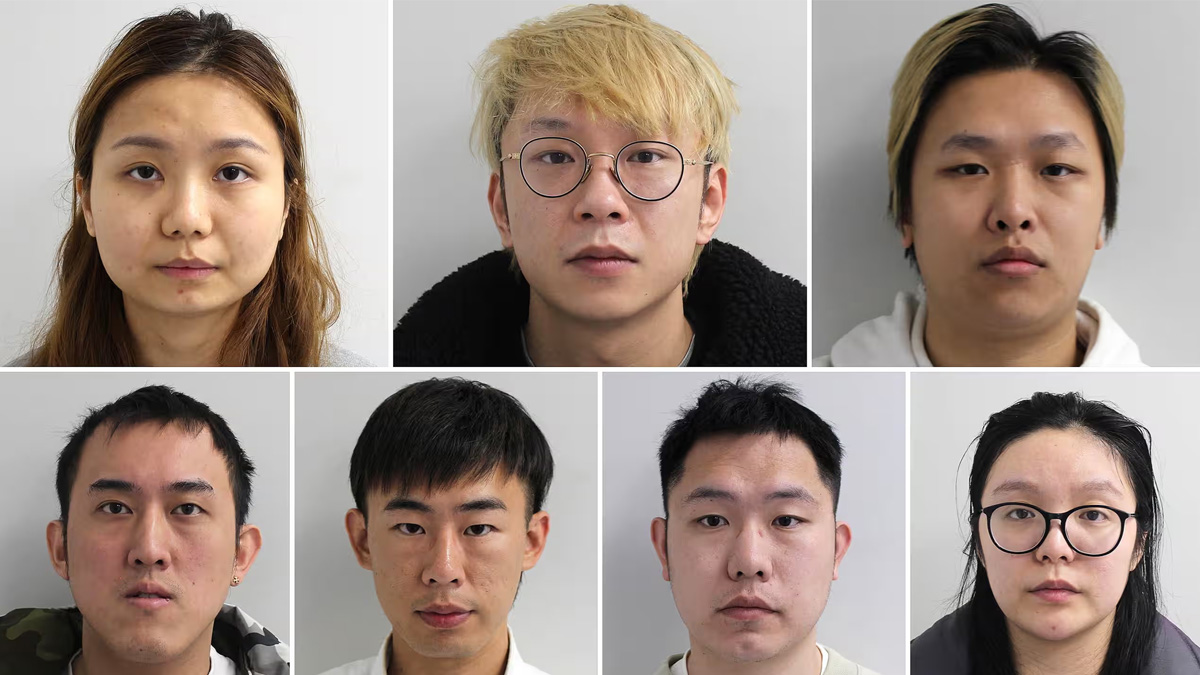
Seven Sentenced in £55 Million Money-Laundering Ring Targeting International Students

Seven individuals have been sentenced for their roles in a sophisticated £55 million money-laundering operation aimed at helping international university students circumvent financial regulations in China. The sentencing took place at Snaresbrook Crown Court, marking the culmination of a three-year investigation by the Metropolitan Police.
The defendants, who were involved in an undercover money-laundering ring, were found guilty of laundering millions of pounds through Chinese underground banking systems between February 2020 and June 2023. The scheme exploited a loophole to bypass China’s strict capital controls, which limit citizens to transferring no more than $50,000 (£38,000) annually for personal purposes abroad.
Four of the accused—three men and one woman—received their sentences on Monday for various money-laundering offences. In June, three others were also sentenced for similar crimes. The sentences ranged from 11 months to 12 years, reflecting the severity and scale of their illicit activities.
The Operation Unveiled
The complex money-laundering operation came to light after officers in Stoke Newington, North London, uncovered the group’s activities. The investigation revealed that the group had laundered a staggering £55 million using underground banking networks, a method that, according to a 2019 report by the National Crime Agency (NCA), is likely widespread among the Chinese diaspora in the UK.
The criminal network used a Chinese messaging app to facilitate the sale of British pounds to international students, allowing them to bypass China’s foreign exchange limits. The money was collected in large sums, sometimes as much as £250,000 at a time, with transactions carefully orchestrated to avoid detection.
In December 2022, simultaneous raids were conducted at two addresses. At a residence in Canary Wharf, officers discovered over £104,000 in a carrier bag hidden in a wardrobe belonging to Xiaoyu Shu, 29, and Yin Ying Wang, 28. At another address linked to Yunchen Huang, 28, police found multiple cash counting machines and money bags, seizing nearly £500,000 in assets.
Further investigations led to the identification of Peng Liu, 28, and Ang Li, 26, also based in Canary Wharf, who were running an unregistered money business. When their residence was searched in June 2023, officers located more counting machines and £14,600 in cash.
The Ringleader and Co-Conspirators
The operation was led by Qiji Wang, 29, based in Manchester. Upon searching Wang’s property, police uncovered a trove of evidence, including numerous mobile phones, computers, bank cards in other people’s names, and a cash counting machine. Ruolan Chen, 28, also from Manchester, was found to have assisted the group by running another unregistered money service business.
The laundering operation was meticulously planned to ensure anonymity among the participants. Those collecting the cash were instructed to take a photo of a £5 banknote with its unique serial number, which would then be passed on to a courier. This method allowed transactions to occur without either party knowing the other’s identity, minimizing the risk of exposure if any of them were apprehended by the authorities.
The Verdict
DC Zach Rowe of the Stoke Newington Proactive Crime Team praised the investigation, stating, “Thanks to the hard work and perseverance of highly skilled officers in the Met, we have been able to disrupt a sophisticated economic crime operation. The sheer scale of this laundering will generate crimes such as illegal drug supply, prostitution, human trafficking, and more.”
Benn Maguire, lead counsel from the legal firm QEB Hollis Whiteman, added, “This successful prosecution has eviscerated the criminal operation, preventing those involved in crime from profiting from their wrongdoing.”
The case serves as a stark reminder of the lengths to which criminal enterprises will go to exploit financial systems and the commitment of law enforcement to bringing such operations to justice.
- Health Insurance Now Covers Nearly Half of Gandaki Province’s Population
- Mercure Kathmandu Extends Financial Support to Cancer Care Nepal
- DRRMNC Urges Swift Action to Tackle Forest Fires and Accelerate Reconstruction Efforts
- Nepal Observes People’s Movement Day to Commemorate Restoration of Democracy












Comments